BEST Giardiniera Recipe (Spicy or Mild)
This post may contain affiliate links. See my disclosure policy.
Not just for hot dogs and muffuletta sandwiches, add this homemade giardiniera to your burgers, nachos, pizzas, pasta salads and anything else your heart desires! This Italian giardiniera recipe is simply the BEST (just check out the rave reviews below). I promise, once you’ve tried this you’ll be hooked for life!
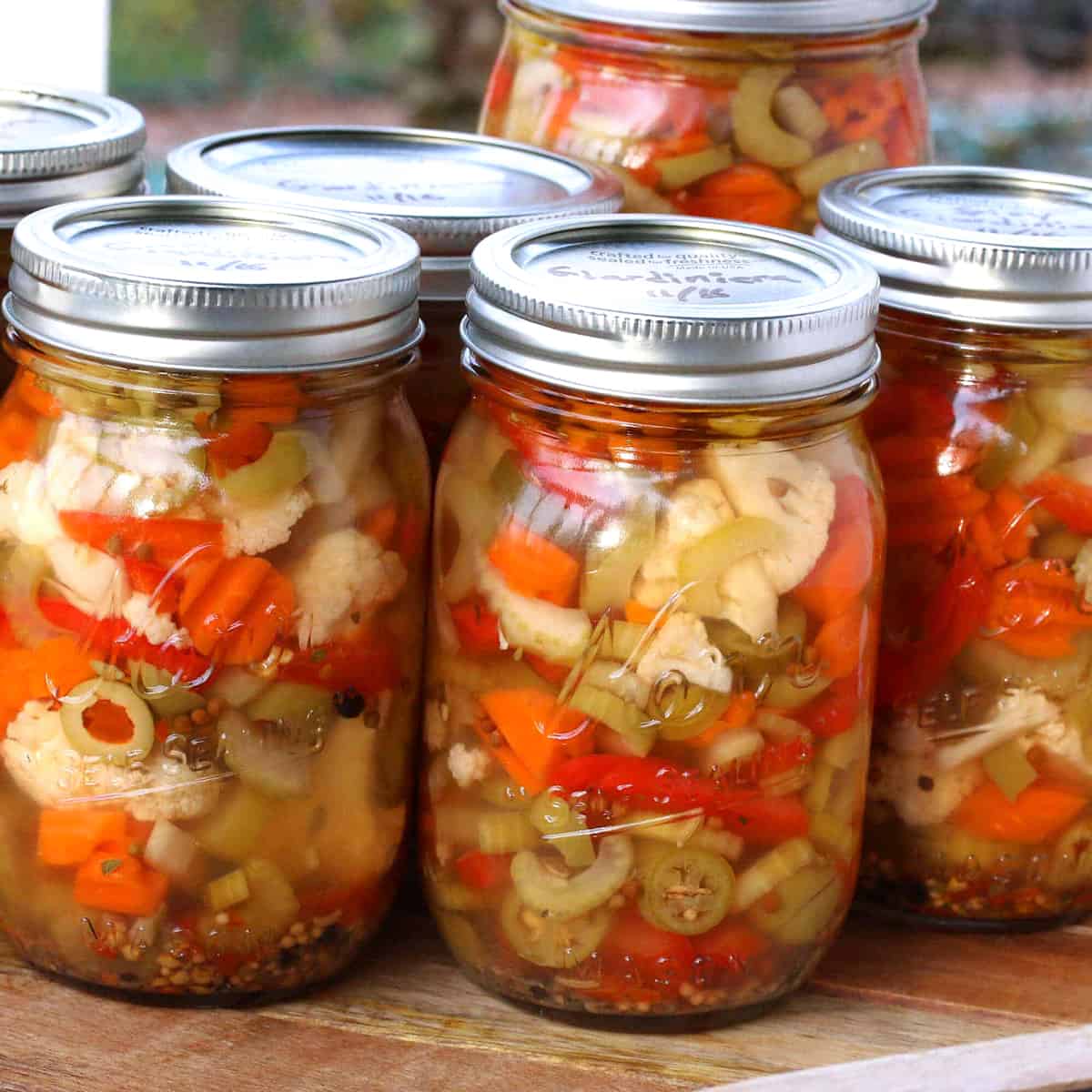
What is Giardiniera?
Giardiniera, pronounced “jar-din-air-ah”, is one condiment you don’t want to be without. It’s one of my favorites and once you’ve tried it I’m confident you’ll fall in love with it too. Originating in Italy, these pickled vegetables were introduced to Chicago in the late 19th century by Italian immigrants and took their place as arguably the city’s most popular condiment. It’s used on practically everything! You name it, giardiniera is just what you need to bring your hot dogs, burgers, sandwiches, nachos, antipasto platters and pasta salads to life. In Chicago you’ll even commonly find it served on pizzas and, of course, no Italian beef sandwich is complete without it. Have you been to New Orleans? Giardiniera is the magical ingredient in those mouthwatering muffuletta sandwiches. In short, giardiniera is the ultimate pickled vegetable relish!
The popularity of giardiniera has continued to grow in Chicago with more than a million pounds of it being sold annually. Still it remains relatively unknown outside of the Windy City except among those with strong Italian roots. So if you’ve never heard of or tried it before, now is your chance to make some absolutely delectable homemade giardiniera that will bring new life and flavor to your favorite foods!
Giardiniera Ingredients & Variations
This giardiniera recipe lends itself easily to any adjustments you’d like to make to suit your tastes, whether it’s adding or swapping vegetables or seasonings. Here’s what you’ll need to make this homemade giardiniera recipe:
- Vegetables: I’m using serrano peppers in this but you can also use jalapenos. You can customize the heat level by adding more or less. We’re also adding a couple of red bell peppers to mix for sweetness and a pop of color. Other vegetables in classic giardiniera are cauliflower, carrots, celery, and some pitted green olives (I love the brininess they contribute). Feel free to add other vegetables if you like, for example pearl onions and green beans.
- Vinegar and Oil: We’re using an equal amount of white wine vinegar and water, which is the right ratio for making this giardiniera recipe safe for canning if you so choose. The white wine vinegar contributes a great flavor and isn’t as harsh as white vinegar. In addition we’re topping off the jars with a little olive oil. If you’re not canning the giardiniera you can add more.
- Seasonings: Garlic is a must. For the spices I really love the combination of oregano, coriander seeds, yellow mustards, fennel seeds, black peppercorns, red pepper flakes, celery seeds and bay leaf. Feel free to change up the ratios or experiment with other spices and herbs like cloves, allspice berries or juniper berries.
You can chop the veggies however large or small you prefer. In Italy the vegetables are usually left in fairly large pieces and that way it’s also more versatile. Left in larger pieces you have the flexibility of serving the giardiniera with your charctuerie/antipasto platters and when you want to use it for sandwiches, hot dogs, pasta salads, etc, you can simply diced up the finished giardiniera into smaller chunks. But left large or diced small, you are simply going to LOVE this giardiniera!
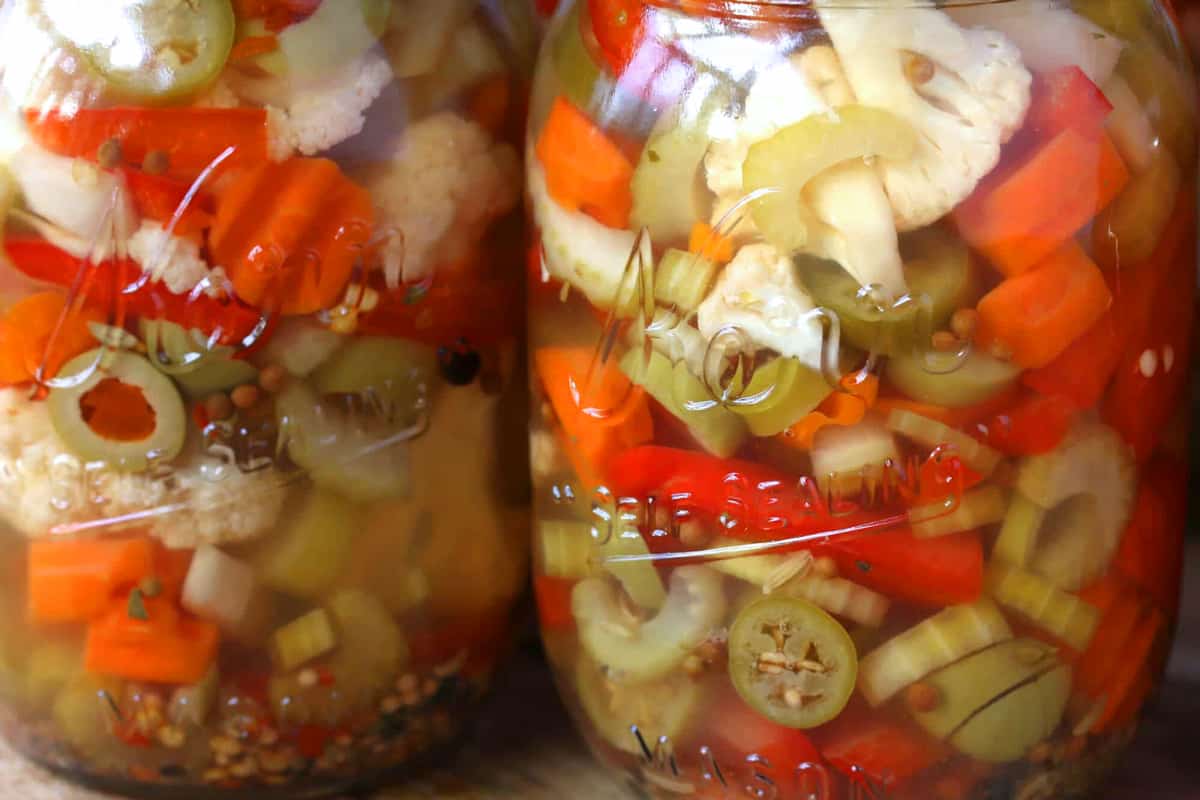
Giardiniera Recipe
Let’s get started!
Chop up the veggies and place them in a large non-reactive pot or bowl. If you’re wondering how to get the crinkle-cut carrots, use a mandolin slicer that has that ability.
Pour 1/4 cup kosher salt over the vegetables.
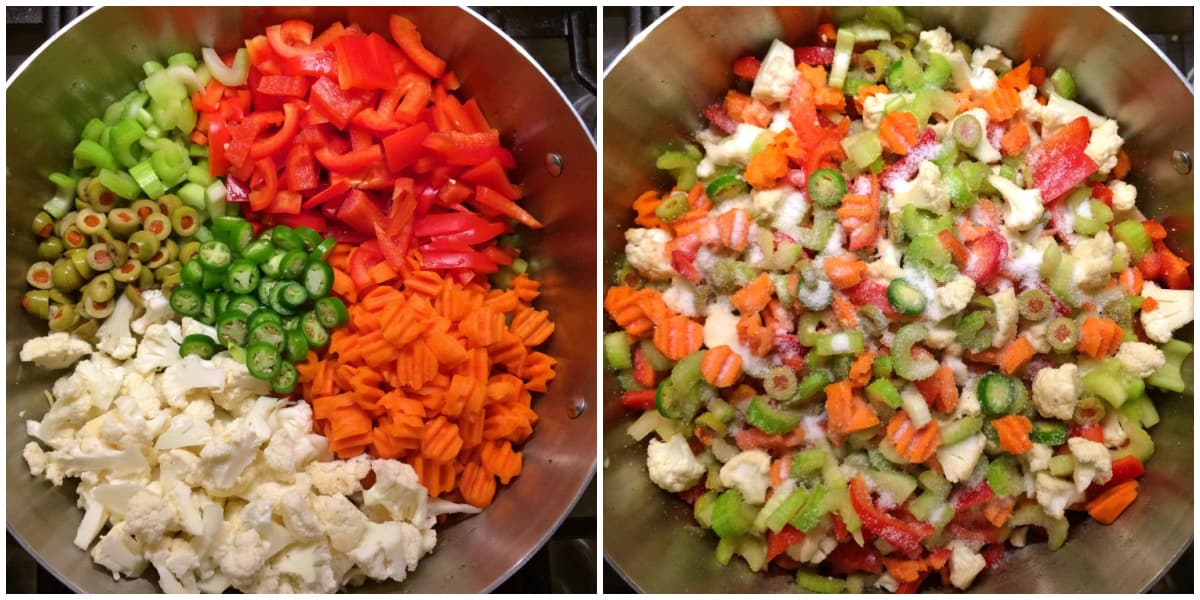
Pour enough water over the vegetables to cover them. Let them soak in the salt water for at least 6 hours or overnight. This step is critical for drawing out excess water from the vegetables which would otherwise dilute the vinegar brine and lead to spoilage.
To prepare the jars, place the spices into each of the jars. I like to make some batches hot and some mild. Do that by using or omitting red chili flakes. For a true Chicago-style giardiniera you’ll want to make it hot!
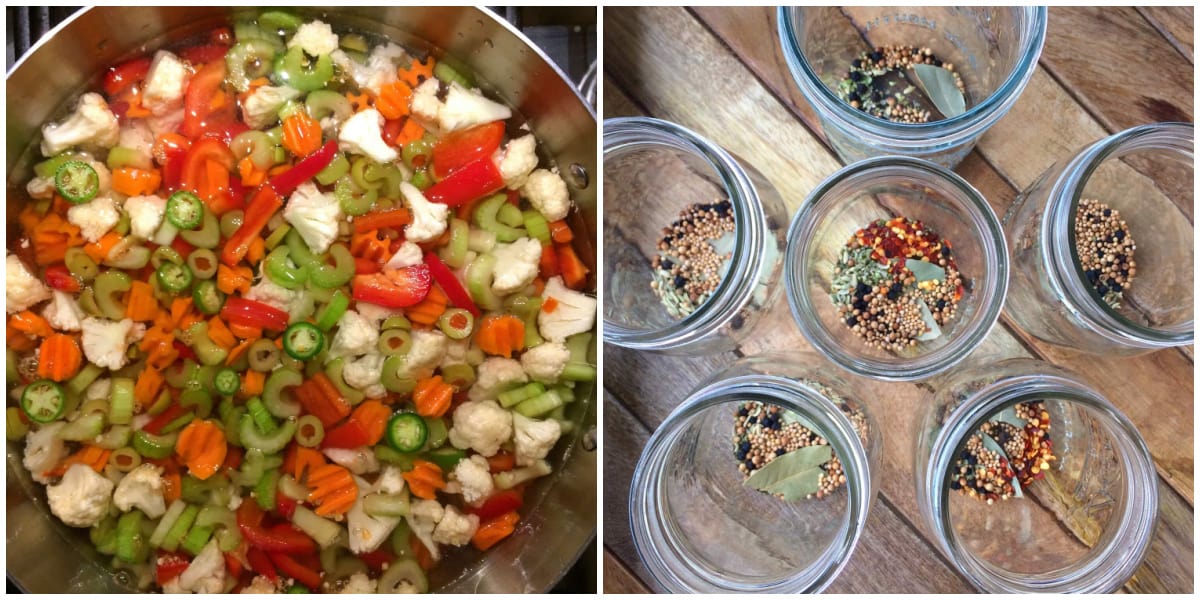
Thoroughly rinse and drain the vegetables before dividing them up between the jars. Pack the vegetables in as tightly as you can. Place the garlic each jar.
Now we’re making a vinegar solution to pickle the vegetables. To play it safe Cooperative Extension Service sources recommend a 1:1 ratio of vinegar to water. Some other recipes may have a lighter vinegar brine but if you’re planning on storing your giardiniera for more than 2 weeks, we recommend this ratio to create enough acidity to prevent the risk of unwanted bacteria.
Bring the water, vinegar and salt to a boil.
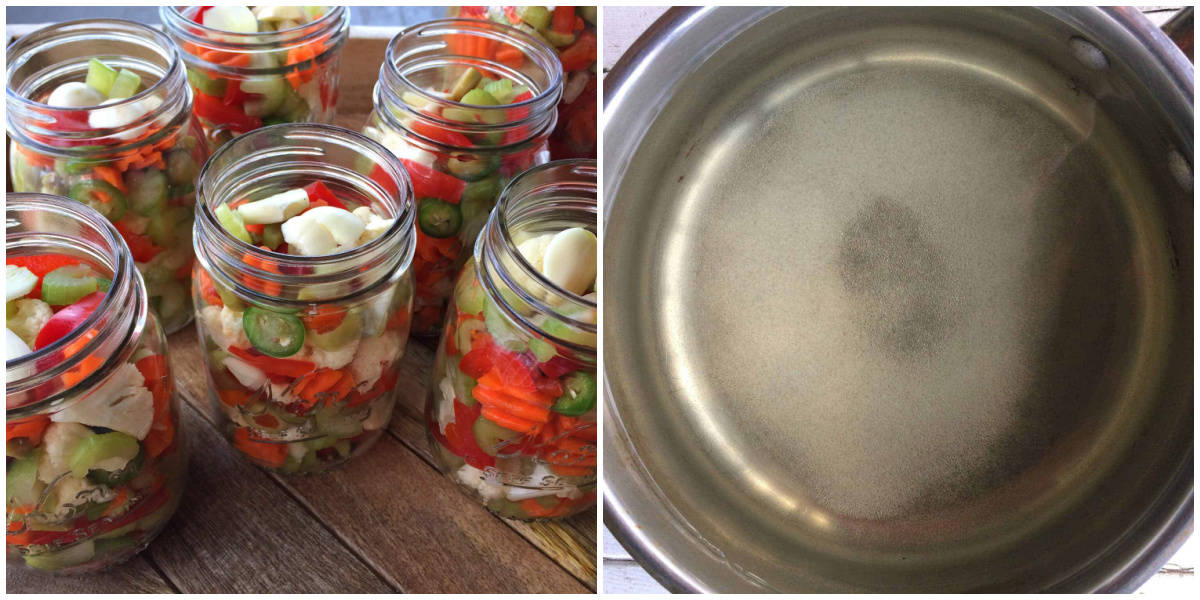
Pour the boiling brine over the vegetables leaving a little more than 1/2 inch headspace from the top. Pour the olive oil over the top. **Omit the oil if you are proceeding with water bath canning the jars. Wipe the rims with a wet paper towel and seal the jars.
If you plan on using the giardiniera within two weeks let the jars sit at room temperature for a day or two and then transfer them to the fridge.
How to Can Giardiniera
As with other pickled vegetables, giardiniera can be canned using the water bath canning method which will enable you to store it long-term to enjoy all year round. No need to pull out the pressure canner. If you’re canning the giardiniera for long-term storage, seal the jars with the lids and rims and prepare a boiling water bath. Boil the jars for 10 minutes. Carefully remove the jars and let them sit undisturbed for 24 hours before moving them.
Adjustments for high altitudes:
- At 1,001 to 6,000 feet (305 to 1,829 meters) above sea level: increase processing time by 5 minutes.
- Above 6,000 feet (1,829 meters) above sea level: increase processing time by 10 minutes.
If processed in the water bath, the giardiniera is best consumed within 6 months but will keep for up to a year.
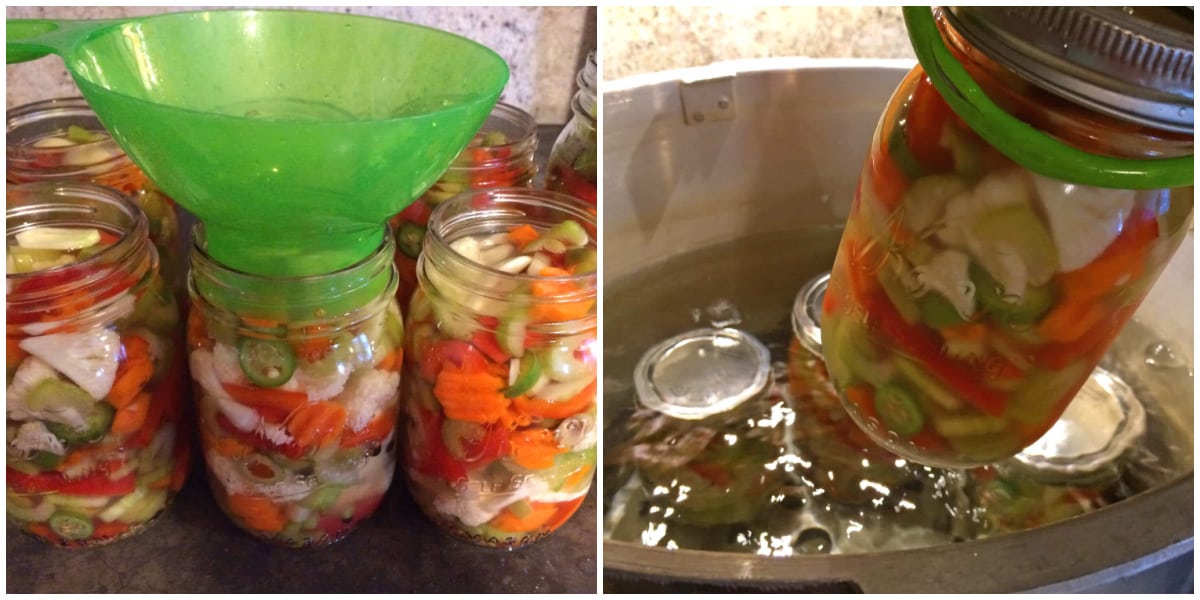
This giardiniera is best eaten after a few days once the flavors have had time to meld. Once opened, store the jar in the fridge where it will keep for up to 2 weeks.
Enjoy!
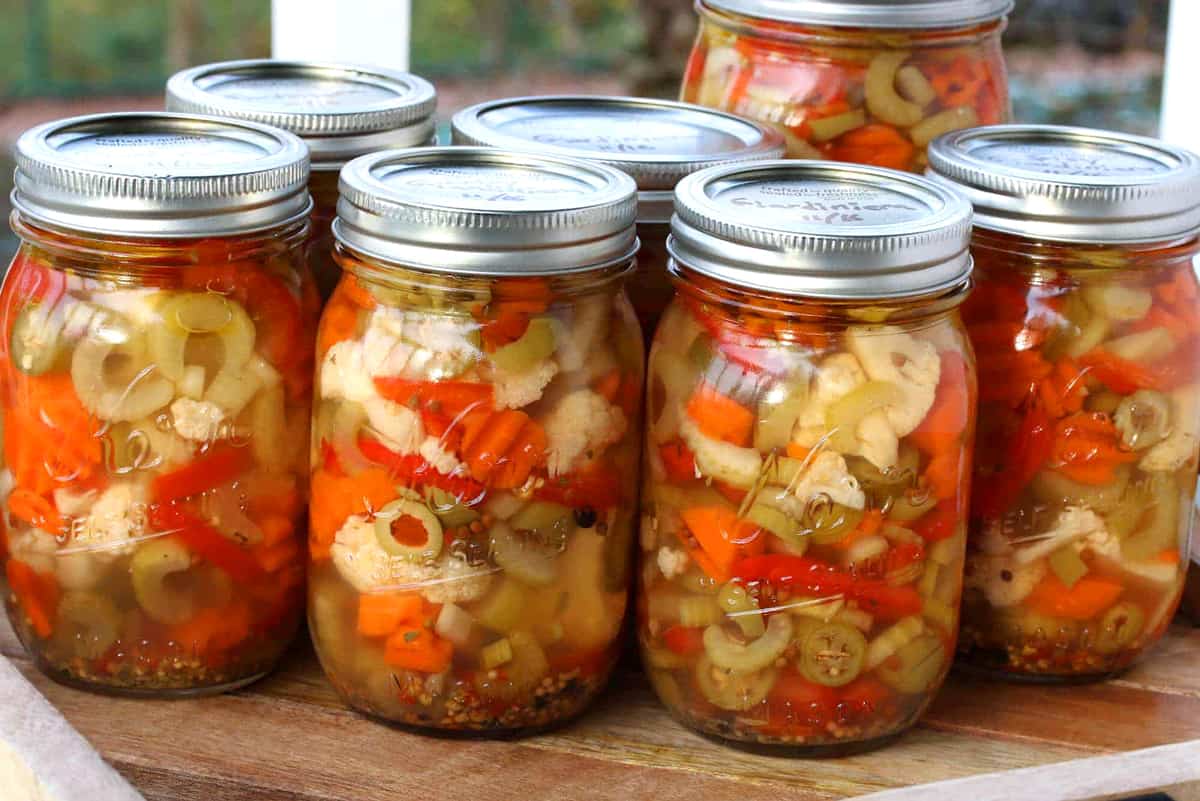
Ways to Enjoy It
Giardiniera can be used in various ways to add a zesty and crunchy element to your dishes. And it’s delicious on its own straight out of the jar. Here are a just few ways you can incorporate giardiniera into your foods:
- Sandwiches and Wraps: It adds a nice crunchy texture and a burst of flavor to the mix. And of course it’s a MUST in your muffuletta sandwich!
- Salads: Toss giardiniera into salads to provide an extra flavor and crunch. Add some to your Macaroni Salad, Potato Salad, and leafy green salads.
- Pizza and Flatbreads: Sprinkle some over your pizza or flatbread before or after baking. It adds a nice bit of tang, richness, and texture.
- Antipasto Platter: Giardiniera is a classic component of antipasto platters. Arrange it alongside cured meats, cheeses, olives, and other pickled items as part of your cheese and charcuterie board.
- Hot Dogs and Sausages: Use it as a topping for hot dogs, brats and sausages. It’s a fun and tasty alternative to the more traditional toppings.
- Tuna or Chicken Salad: Mix it into tuna or Chicken Salad to give it a zesty kick of flavor and some contrasting texture.
- Omelets and Scrambled Eggs: Fold some into your omelet or scrambled eggs for flavor and crunch.
- Grains, Grain Bowls and Rice Dishes: Incorporate it into your grains, grain salads (like my Greek Wheat Berry Salad), grain bowls, and rice dishes for flavor, color and texture.
- Burgers: Top your burgers with it for a fun and tasty flavor twist.
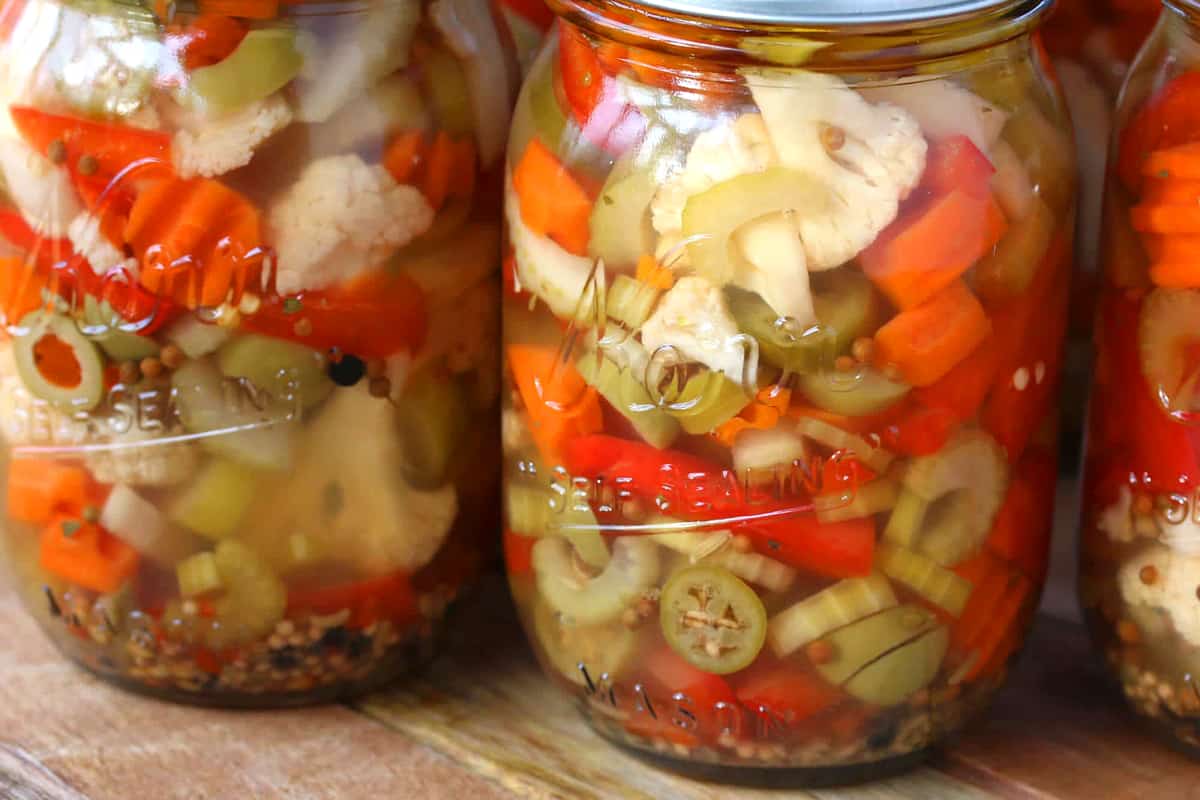
For more great pickled veggie and relish recipes be sure to try my:
- Dill Pickle Relish
- Sweet Pickle Relish
- Sweet Corn Relish
- Sweet Pepper & Onion Relish
- Pickled Onions
- Pickled Okra
- Pickled Banana Peppers
- Pickled Pepperoncini Peppers
- Pickled Green Beans
- Pickled Carrots
- Pickled Jalapenos
- Pickled Beets
Save This Recipe
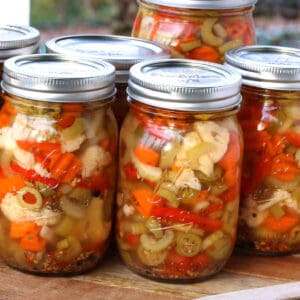
BEST Giardiniera Recipe (Spicy or Mild)
Ingredients
- 1/2 head cauliflower, chopped into small florets
- 10 ribs celery , diced
- 5 carrots , diced
- 2 large red bell peppers , seeded and chopped
- 1 cup sliced green pitted olives
- 4 serrano peppers (or more according to heat preference) , sliced
- Spices/Ingredients for EACH pint jar:
- 1/2 teaspoon dried oregano
- 1/2 teaspoon coriander seeds
- 1/4 teaspoon yellow mustard seeds
- 1/4 teaspoon fennel seeds
- 1/4 teaspoon black peppercorns
- 1/4 teaspoon red chili flakes (optional, for hot giardiniera)
- 1/8 teaspoon celery seeds
- 1 bay leaf
- 1 clove garlic, cut in half
- 1 tablespoon extra virgin olive oil
- For the Brine:
- 4 cups white wine vinegar
- 4 cups water
- 2 tablespoons kosher salt
Instructions
- Place the chopped veggies a large non-reactive pot or bowl. Pour 1/4 cup kosher salt over the vegetables and enough water to cover them. Let the vegetables soak in the salt water for at least 6 hours or overnight.
- To prepare the jars, place the spices into each of the jars, reserving the garlic and olive oil until after the brine is added. (I like to make some jars hot and some mild by adding/omitting the red chili flakes).
- Thoroughly rinse and drain the vegetables before dividing them up between the jars. Pack the vegetables in as tightly as you can. Place a clove of garlic (cut in half) in each jar.
- To make the brine: Bring the water, vinegar and salt to a boil. Pour the boiling brine over the vegetables leaving a little more than 1/2 inch headspace from the top. Pour a tablespoon of olive oil over the top in each jar (omit the oil if water bath canning). Thoroughly wipe the rims with a wet paper towel, ensuring no oil or other residue is on them, and seal the jars.
- If you plan on using the giardiniera within two weeks let the jars sit at room temperature for a day or two and then transfer them to the fridge. The flavor only gets better with time so wait at least 2-3 days before eating it. Will keep refrigerated for 2 weeks.
- If you're canning the giardiniera for long-term storage, seal the jars with the lids and rims and prepare a boiling water bath. Boil the jars for 10 minutes. Carefully remove the jars and let them sit undisturbed for 24 hours before moving them.If processed in the water bath, the giardiniera is best consumed within 6 months but will keep for up to a year.Note: If you're canning the jars for long-term storage you can add the oil later to your giardiniera when you open the jar.
Notes
- At 1,001 to 6,000 feet (305 to 1,829 meters) above sea level: increase processing time by 5 minutes.
- Above 6,000 feet (1,829 meters) above sea level: increase processing time by 10 minutes.
Nutrition
Originally published on The Daring Gourmet August 21, 2017



















Do you leave it out overnight or in the t refridgerstor?
Hi Lizzy, I leave it out at room temperature. If your “room temperature” is hot then put it in the refrigerator.
This recipe is great and forgiving. I didn’t have coriander or mustard seeds so added 1/4-1/2 teaspoon each of those ground spices. I couldn’t tell it had any negative effect on the recipe. It was great. I had a few leftover fresh vegetables and brine so stuck it in the refrigerator and had it the next day for a salad. I figure I’ll blow through the jars I canned and have to make more soon.
Fantastic, Aimee, thanks so much for the feedback!
I’ve followed your recipe. If I wanted to change the brine to include Soy Bean Oil, what would you suggest using your white wine vinegar and water? Unless I add the Soy Bean Oil on the top of the vegetables instead of the Virgin Olive Oil. Thank you.
Hi Diana, I’m not sure I understand the question but if you’re asking if you can substitute soybean oil for the olive oil you can do that without any other changes to the brine ingredients.
How long does it take for the giardiniera to pickle if you have canned them in the hot water bath? I’m excited to taste this recipe.
Hi Cindy, I’d wait at least 2-3 days and the longer the better – the flavor gets better with time!
I am canning veggies for this recipe and I see it calls for “white wine vinegar”. Will a distilled white vinegar 5% be able to be substituted since I don’t have 4 cups of the wine vinegar? Also, can I include celery in this recipe using the water bath technique or would i need to pressure cook it instead?
Hi Sharon, yes you can, it will just have a harsher flavor, white wine vinegar is milder tasting. And yes, you can include celery in it without having to pressure can it.
Hi! I have just started playing around with brining and having a great time. Then I spotted this after buying a jar. Awesome! My newbie question is..when you seal the bottles and submerge them in boiling water for 10 min…wouldn’t they boil inside and break or pop or something? Thanks for this instruction btw!!
Hi Fred, canning it enables you to store it for longer but yes, the process will result in vegetables that are softer than had you not canned them but they’ll still retain some of the their crunch. As for anything breaking, just be sure to use proper mason jars meant for canning if you’re going to can the giardiniera..
Slide knife in jar to get air bubbles out.
Hi Fred. When ever you boil preserves in mason jars you only place the lid rings on fingertip tight. Then when the pressure builds in the jar after submerging it in the hot water it will slowly escape out of the lid and it won’t get up height enough to cause the jars to break/explode :)
Born and raised from Chicagoland area, now living somewhere else. Although I do like this recipe, the giardiniera I ate back home for sure had a lot more oil than 1 tbsp per jar. Maybe add less vinegar and substitute for more olive oil to get that classic oily giardiniera condiment.
Whee! Hot! Ha.
Cauliower is my favorite but not too many in your jar.
Question: what other veggies can i try? Brussels sprouts? Broccoli? I will chop finely the celery before adding to a salad as it’s strong. Thank you. Lisa
Hi Lisa, you can add any veggies you like – pick your favorites.
If I only wanted to make a small batch without canning, what do you suggest? How long would it be safe to eat if we’ll-refrigerated? Thank you!
Hi Judy, you can absolutely make a smaller batch and refrigerate it. It will keep for about 2 weeks in the fridge, possibly longer – just keep an eye on it to make sure the veggies are submerged under the brine to prevent mold development, or give the jar a shake every few days.
if i put my jars of giardiniera in boiling water bath how do i store the finished jars-in a refrig or on storage shelves
Hi Beverly, if you’re water bath canning them you can store them outside the fridge on storage shelves.
Tried this a few weeks ago. It tastes great! Best Giardiniera I ever ate. I like hot stuff so just added a couple of extra Serrano peppers and no red pepper flakes, heat was about right. One thing I did wrong was to use the same old olive oil we use for cooking, it was rather oxidized, so want to let everyone know to only use fresh olive oil.
I really thought all the spices at the bottom were overkill until I tasted it, they make all the difference! However, I do find them difficult when eating the Giardiniera. Should I mix them all up before eating or just try not to disturb them. So far I have been trying not to disturb them and really can’t eat the last few bites at the bottom as they are just too spicy! Thank you!
Thank you, Gary, I’m so glad you enjoyed it and appreciate the feedback!
Would the processing time change with the addition of black olives along with the green? I am used to there being a lot more olives in this.
Hi Barb, you can add in some more olives without having to alter the processing time.
Could you switch up the veggies if you wanted?
Hi Katie, yes you can.
What size jars is this recipe for, pint or quart?
Hi Maria, this makes about 6 pint jars.
Can I use plain white vinegar instead of white wine vinegar?
Hi Stephanie, from a safety standpoint yes, you can. But from a flavor standpoint regular white vinegar has a much harsher flavor and for that reason I recommend white wine vinegar.
Question..when you double the amount from 6 to 12 pints the jar dry ingredients also double.
I’m guessing that’s wrong…just leave it as 6 pints but double the vegetables..yes?
Hi Brian, if you’re going to double the recipe you’ll need to double all of the ingredients. The jar size can remain the same, you’ll just need to double the number of jars.
I’m so sorry if you’ve already answered this previously but do you have to alter the amount of salt you use during the soak if you multiply the yield by 2 or 3?
Hi Kay, in this case it’s probably sufficient to stick with the 1/4 cup of salt if you’re doubling the recipe. If you’re tripling it you may want to add an extra tablespoon or so.
Absolutely fantastic recipe! Made as written, and now that I’ve tasted a jar am going to be making recipes 4, 5, and 6! Put on top of a green salad. The liquid in the jar, shaked, makes a fantastic dressing. Forget about all the canning police. We reuse canning lids as the old timers have since the depression. I don’t buy into all the hype from companies and pete and repeats to push you to buy new lids. Absolutely fine! If a canning lid pops, one should be educated enough to proceed with caution, regardless of new or reused lid.
Thank you, Susan, I’m so glad you enjoyed it!